
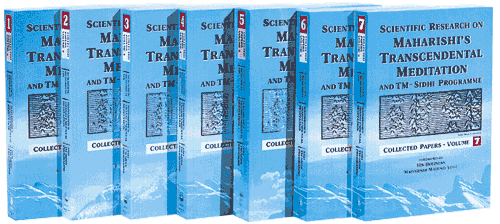
| ‘Through the window of science we see the dawn of the Age of Enlightenment.’ —Maharishi |
The following findings are a brief summary of the hundreds of scientific papers, relevant to the field of management in every area, published in Scientific Research on Maharishi’s Transcendental Meditation and TM-Sidhi Programme: Collected Papers—Volumes 1–6 [over 5,000 pages; Volume 7 is in press]. More than 600 scientific studies, conducted at over 250 independent research institutions in 33 countries, objectively document the benefits of Maharishi’s Transcendental Meditation and TM-Sidhi Programme, and prove their extraordinary value to actualize the highest Vedic ideals of life, bringing fulfilment to the individual and to all areas of society.. (Refer to: www.tm.org/research/508_studies.html)
These studies are a record of the historic transformation of time, from the scientific age to the Age of Enlightenment, brought about by Maharishi’s teachings, which have opened the gates of enlightenment for millions of people, leading to the establishment of an ideal quality of life for the whole world—Heaven on Earth.
A Brief Summary of Results
An analysis of findings indicating fulfilment
of the goals of organizational development
[The numbers within parentheses after each
finding refer to the numbers of the
original research studies as printed in the six volumes of the Collected Papers.]
Increased Organizational Ability
- Greater Organizational Ability (Vol. 2:
164)
- Increased Time Competence: Increased Ability to Think and Act Efficiently
in the Present (Vol. 1: 69, 70, 76, 94; Vol.
2: 151, 153, 155)
- Greater Ability to Assign Correct Priorities (Vol.
2: 164)
- Greater Decision-Making Ability (Vol. 2:
164)
- Increased Practicality and Realism (Vol.
2: 153)
- Increased Leadership Ability and Boldness (Vol.
1: 73; Vol. 2: 153)
- Decreased Number of Situations in Life Perceived as Problems (Vol.
2: 142)
- Decreased Number of Serious Problems Experienced (Vol. 2: 142)
Increased Intelligence and Creativity
- Increased Intelligence (Vol. 1: 53–55,
62, 103; Vol. 2: 150; Vol. 3: 257, 261, 265; Vol. 4: 307; Vol.
5: 382, 387, 389, 390, 392, 393)
- Improvement in Reaction-Time Measures Correlated with Intelligence (Vol.
5: 390)
- Improved Cognitive Flexibility (Vol. 3:
253; Vol. 4: 300; Vol. 5: 380)
- Increased Academic Achievement (Vol. 1: 59–61; Vol. 4: 306; Vol. 5: 385–387, 391)
Optimizing Brain Functioning
- Increased Orderliness of Brain Functioning (Vol.
1: 1–4, 14–18, 20, 102; Vol. 2: 115, 117, 121; Vol.
3: 205, 210, 211, 213, 215, 217, 218, 224; Vol. 4: 294–296)
- Increased Integration of Brain Functioning (Vol.
1: 14–17, 20, 102; Vol. 3: 205, 210, 211, 213, 215, 217,
218, 224; Vol. 4: 294–296; Vol. 5: 370, 371, 375)
- Increased Brainwave Coherence (Vol. 1: 20,
21, 102; Vol. 3: 205, 210, 213, 215, 217, 218, 224; Vol. 4: 294,
296; Vol. 5: 370, 371)
- Increased EEG Coherence during Acquisition of New Information Found
in Participants of Maharishi’s Transcendental Meditation Programme (Vol.
5: 372)
- Improved Right Hemispheric Functioning—Improved Synthetic
and Holistic Thinking (Vol. 1: 103; Vol. 2:
135, 140; Vol. 3: 257, 260; Vol. 5: 393)
- Increased Sensitivity, Strength, and Flexibility of the Nervous
System (Vol. 4: 301)
- Faster Processing of Cognitively Complex Information in the Elderly (Vol. 5: 374)
Increased Clarity of Thinking and Perception
- Increased Field Independence, Indicating Broader Comprehension
and Increased Ability to Focus Attention (Vol.
1: 51, 52, 103; Vol. 3: 255, 257, 259; Vol. 4: 307; Vol. 5: 384,
389)
- Increased Mental Clarity and Wakefulness (Vol.
2: 147)
- Improved Concentration (Vol. 2: 132)
- Improved Comprehension (Vol. 2: 132)
- Improved Stabilization of Organized Memory (Vol.
1: 58)
- Improved Problem-Solving Ability (Vol. 1:
58, 62)
- Greater Flexibility of Mental Orientation (Vol. 1: 71)
Increased Energy and Dynamism
- Increased Vigour (Vol. 1: 65, 77; Vol. 3:
277)
- Increased Energy Level (Vol. 1: 62)
- Increased Persistence (Vol. 2: 153)
- Growth of a More Brave, Adventurous, Action-Oriented Nature (Vol.
1: 73)
- Greater Physical Well-Being (Vol. 4: 308)
- Decreased Drowsiness (Vol. 2: 126, 147)
- Decreased Lethargy (Vol. 2: 126, 147)
- Decreased Fatigue (Vol. 2: 147; Vol. 3: 238; Vol. 4: 308)
Increased Efficiency
- Greater Ability to Achieve More with Less Effort (Vol.
2: 164)
- Increased Effectiveness (Vol. 1: 65; Vol.
2: 161; Vol. 3: 277)
- Improved Work Performance (Vol. 1: 96, 97; Vol. 2: 161; Vol. 5: 399)
Increased Job Satisfaction
- Reduced Job Worry and Tension (Vol. 5: 399)
- Reduced Anxiety about Promotion (Vol. 1:
96)
- Improved Relationships at Work and Improved Personal Relationships (Vol.
5: 399)
- Improved Relations with Co-Workers (Vol.
1: 96, 97)
- Improved Relations with Supervisors (Vol. 1: 96, 97)
A Unique State of Deep Rest during Maharishi’s Transcendental
Meditation Technique to Neutralize Stress Caused by Routine Work
- The Experience of Pure Consciousness Found to Be Associated with
High EEG Coherence; Marked Reductions in Respiration Rate, Heart
Rate, and Metabolic Rate; Periodic Natural Breath Suspension; Absence
of Spontaneous Skin Resistance Responses; High Basal Skin Resistance (Vol.
1: 7; Vol. 3: 197, 205, 213, 218; Vol. 4: 293; Vol. 5: 358)
- Increased Blood Flow to the Brain (Vol.
2: 105, 106; Vol. 3: 194, 195)
- EEG Indications of a Unique State of Restful Alertness (Vol. 1: 1–4, 7, 14, 15, 17, 18; Vol. 2: 117; Vol. 3: 211, 213, 220; Vol. 5: 369)
Increased Freedom from Stress
- More Effective Interaction with the Environment: Improved Resistance
to Stress (Vol. 1: 25–28; Vol. 2: 123;
Vol. 5: 370)
- Greater Physiological Calmness during Task Performance (Vol.
2: 122; Vol. 5: 372, 399)
- A Unique Pattern of DNA Repair (Vol. 5: 360)
Creating Unbounded Awareness—
To Neutralize the Boundaries Caused by Routine Work
- Growth of Experiences of Higher States of Consciousness (Vol. 1: 7, 19, 99–104; Vol. 3: 216, 258, 284; Vol. 4: 312; Vol. 5: 395, 397)
Growth of Personal Integration and Fulfilment
- Increased Self-Actualization: Increased Integration, Unity, and
Wholeness of Personality (Vol. 1: 64, 67,
69, 70, 72, 74, 76, 78, 94; Vol. 2: 139, 144, 151, 153, 155; Vol.
3: 239; Vol. 5: 395)
- Greater Orientation toward Positive Values: Better Recall for Positive
Words than for Negative Words; Lower Recognition Thresholds for Positive
Words than for Negative Words; More Positive Appraisal of Others (Vol.
5: 394)
- Greater Commitment to Personal Development (Vol.
2: 138)
- Increased Inner-Directedness: Greater Independence and Self-Supportiveness (Vol.
1: 64, 69, 70, 72, 76, 94; Vol. 2: 139, 151, 153, 155; Vol. 3:
268)
- Increased Ego Strength (Vol. 1: 67; Vol.
2: 150, 153)
- Less Sensitivity to Criticism (Vol. 1: 67)
- Less Need to Belong and Be Accepted (Vol.
3: 268)
- Enhanced Self-Regard and Self-Esteem (Vol.
1: 62, 64, 67, 69, 76, 90; Vol. 2: 139, 151, 153, 156, 158; Vol.
3: 239, 266, Vol. 5: 371)
- Enhanced Inner Well-Being (Vol. 2: 125,
147; Vol. 4: 310; Vol. 5: 395)
- Increased Inner Calm and Tranquillity (Vol.
1: 65, 73, 77; Vol. 2: 150; Vol. 4: 308, 316)
- More Balanced Mood (Vol. 1: 65, 77; Vol.
3: 277; Vol. 4: 308)
- Increased Naturalness (Vol. 1: 65, 77; Vol.
3: 277, 290; Vol. 4: 308)
- Increased Emotional Stability (Vol. 1: 65,
71, 77, 87, 93, 95; Vol. 2: 150, 153, 158; Vol. 3: 241, 273, 277,
290; Vol. 4: 308)
- Increased Emotional Maturity (Vol. 1: 65,
77; Vol. 2: 150, 153, 158; Vol. 3: 290; Vol. 4: 308)
- Increased Altruism (Vol. 1: 71; Vol. 2:
138)
- High Level of Moral Atmosphere (Vol. 4:
309)
- Decreased Behavioural Rigidity (Vol. 1: 87, 103; Vol. 3: 250; Vol. 4: 300; Vol. 5: 380)
Improved Social Relationships
- Increased Social Maturity (Vol. 2: 138;
Vol. 3: 261)
- Increased Social Self; Increased Moral-Ethical Self (Vol.
5: 371)
- Greater Sense of Social Responsibility (Vol.
2: 138, 158)
- Greater Orientation toward Positive Values (Vol.
5: 394)
- Increased Sociability (Vol. 1: 65, 73, 77;
Vol. 2: 138; Vol. 3: 261, 266, 277, 290; Vol. 4: 316)
- Increased Outgoingness and Tendency to Participate (Vol.
1: 73; Vol. 2: 150, 153)
- Greater Respect for the Views of Others (Vol.
2: 164)
- Improved Ability to Appreciate Others (Vol.
3: 271)
- Improved Relationships at Work and Improved Personal Relationships (Vol.
5: 399)
- Increased Trust (Vol. 1: 67; Vol. 2: 138,
150)
- Increased Respectfulness (Vol. 1: 65, 77; Vol. 2: 164; Vol. 3: 277, 290)
Growth of Perfect Health
- Lower Health Insurance Utilization Rates: Significantly Fewer Hospital
In-Patient Day; Fewer Outpatient Visits; Fewer In-Patient Admissions
for All Major Categories of Disease (Vol.
5: 378)
- Improved Health of the Cardiovascular System (Vol.
1: 32–35; Vol. 2: 124, 125, 130; Vol. 3: 202, 232, 233, 235,
236, 238, 244–247; Vol. 4: 300; Vol. 5: 367, 378, 380)
- Improved General Health (Vol. 1: 2, 40–42, 44, 95; Vol. 2: 125–127, 150, 153, 157, 160; Vol. 3: 232, 238, 239, 241, 243, 247, 278, 280, 290; Vol. 4: 300, 314; Vol. 5: 377–380, 399)
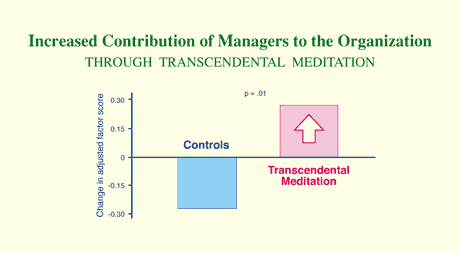
| Managers at a medical equipment company who learnt the Transcendental Meditation Programme, compared to matched controls, showed increased ‘organizational contribution’, which was a combined index of observer ratings of higher productivity, better leadership practices, better work relationships, greater vitality, greater mental health, higher job satisfaction, and less anger. Reference: Dissertation Abstracts International 57(6): 4068B, 1996. |
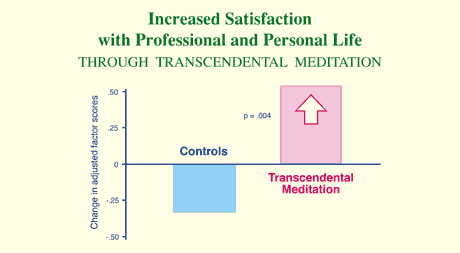
| After three months of regular practice of the Transcendental Meditation Programme, employees showed increased satisfaction with professional and personal life, in comparison to controls from the same work sites. Reference: Anxiety, Stress and Coping: An International Journal 6: 245–262, 1993. |
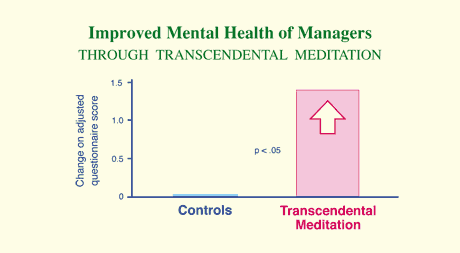
| Managers who learnt the Transcendental Meditation Programme, in contrast to matched controls, increased significantly on a standardized self-report measure of mental health during a three-month study. Reference: Dissertation Abstracts International 57(6): 4068B, 1996. |
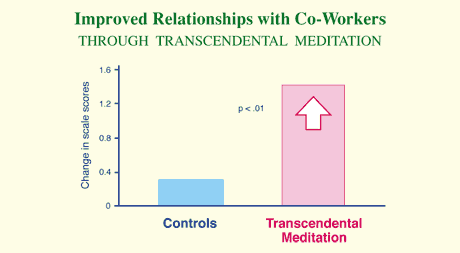
| Employees who learnt Maharishi’s Transcendental Meditation Programme showed improved relationships with their co-workers, in comparison to control subjects. Reference: Academy of Management Journal 17: 362–368, 1974. |
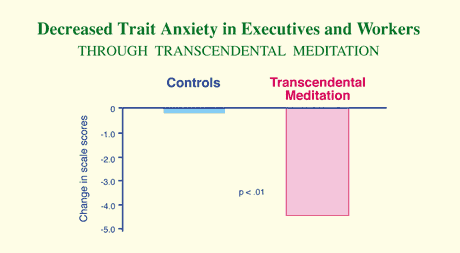
| A study of executives and workers in the automotive industry found that after three months of regular practice of the Transcendental Meditation Programme, employees showed decreased trait anxiety, in comparison to controls from the same work sites. Reference: Anxiety, Stress and Coping: An International Journal 6: 245–262, 1993. |
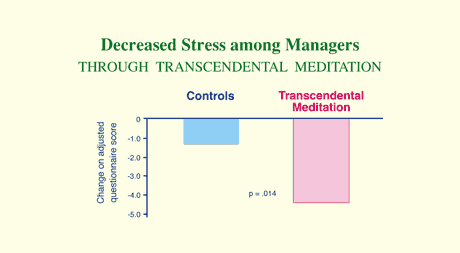
| Managers at a medical equipment company who learnt Transcendental Meditation, compared with matched controls, showed a significant reduction on a standardized measure of perceived stress measuring the degree to which situations in one’s life are perceived as overloading, uncontrollable, or unpredictable. Reference: Dissertation Abstracts International 57(6): 4068B, 1996. |
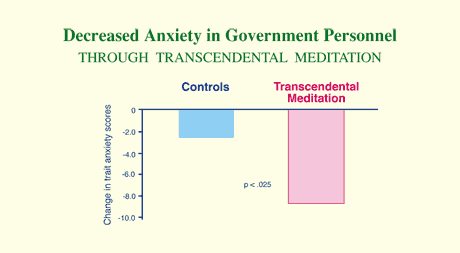
| Employees at a high-security government agency who learnt the Transcendental Meditation Programme showed decreased anxiety, in comparison to control employees who participated in an educational stress-management programme. Reference: Anxiety, Stress and Coping: An International Journal 10: 341–350, 1997. |
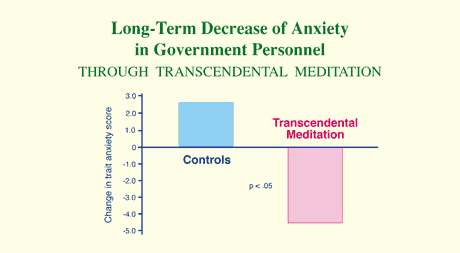
| Government employees who learnt the Transcendental Meditation Programme were measured again after three years, and were found to display a long-lasting decrease in anxiety, in comparison to control employees who had participated in an educational stress-management programme. Reference: Anxiety, Stress and Coping: An International Journal 10: 341–350, 1997. |

| Managers of a medical equipment company who learnt the Transcendental Meditation Programme, in contrast to matched controls, showed a significant increase on a standardized scale of physical vitality, measuring greater energy level and less fatigue. Reference: Dissertation Abstracts International 57(6): 4068B, 1996. |
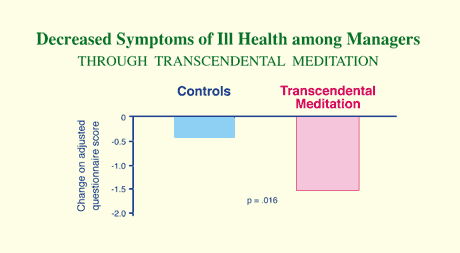
| Managers who learnt the Transcendental Meditation Programme, in comparison to matched controls, showed a significant decrease on a standardized measure of stress-related somatic symptoms, such as chest pain and headaches, during a three-month study. Reference: Dissertation Abstracts International 57(6): 4068B, 1996. |
In Conclusion
Maharishi spoke the following words over forty years ago. The truth of these words is reflected for all times in the vast body of scientific research conducted on Maharishi’s Vedic Science and Technology since then:
‘Generation after generation man is born anew. Each generation gives rise to new aspirations in life and brings a new quest for fulfilment. Each man needs sound physical and mental health, greater ability in action, a greater capacity to think clearly, increased efficiency in work, and more loving and rewarding relationships with others. He needs enough vitality and intelligence to satisfy the desires of his mind and bring contentment to his life. We have seen that all this can be gained through the regular practice of Transcendental Meditation.
‘. . . A new humanity will be born, fuller in conception and richer in experience and accomplishments in all fields. Joy of life will belong to every man, love will dominate human society, truth and virtue will reign in the world, peace on earth will be permanent, and all will live in fulfilment in fullness of life in God Consciousness.’
Science of Being and Art of Living—Transcendental Meditation
[374-page publication]
Links for related websites:
Maharishi Corporate Development
Programme: www.tm.org/mcdp
Master of Business Administration (MBA) Programme,
MUM, USA: www.mum.edu/management/
Maharishi Institute of Management, India: www.maharishiinstituteofmanagement.com
Maharishi
Corporate Development Programme, India: www.mcdpindia.com
Benefits in the Workplace: www.tm.org/benefits-workplace
Also visit: www.TruthAboutTM.com